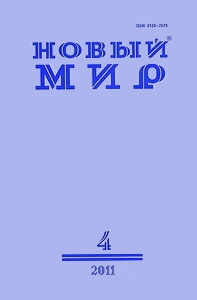Novy Mir
 | |
| Editor | Andrei Vasilevsky |
|---|---|
| Categories | Literary magazine |
| Frequency | Monthly |
| First issue | January 1925 |
| Country | Russia |
| Based in | Moscow |
| Language | Russian |
Novy Mir (Russian: Новый мир, lit. 'New World', IPA: [ˈnovɨj ˈmʲir]) is a Russian-language monthly literary magazine.[1]
History[edit]
Novy Mir has been published in Moscow since January 1925.[1][2] It was supposed to be modelled on the popular pre-Soviet literary magazine Mir Bozhy ("God's World"),[3] which was published from 1892 to 1906, and its follow-up, Sovremenny Mir ("Contemporary World"),[4] which was published from 1906 to 1917. Novy Mir mainly published prose that approved of the general line of the Communist Party.
In the early 1960s, Novy Mir changed its political stance, leaning to a dissident position. In November 1962 the magazine became famous for publishing Aleksandr Solzhenitsyn's groundbreaking One Day in the Life of Ivan Denisovich, a novella about a prisoner of the Gulag. In the same year its circulation was about 150,000 copies a month.[5] The magazine continued publishing controversial articles and stories about various aspects of Soviet and Russian history despite the fact that its editor-in-chief, Alexander Tvardovsky, facing significant political pressure, resigned in February 1970. With the appointment of Sergey Zalygin in 1986, at the beginning of perestroika, the magazine practised increasingly bold criticism of the Soviet government, including figures such as Mikhail Gorbachev. It also published fiction and poetry by previously banned writers, such as George Orwell, Joseph Brodsky and Vladimir Nabokov.
Editors-in-chief[edit]
- Ivan Skvortsov-Stepanov (1925–1926)
- Vyacheslav Polonsky (1926–1931)
- Ivan Gronsky (1931–1937)
- Vladimir Stavsky (1937–1941)
- Vladimir Shcherbina (1941–1946)
- Konstantin Simonov (1946–1950)
- Alexander Tvardovsky (1950–1954)
- Konstantin Simonov (1954–1957)
- Alexander Tvardovsky (1958–1970)
- Valery Kosolapov (1970–1974)
- Sergei Narovchatov (1974–1981)
- Vladimir Karpov (1981–1986)
- Sergey Zalygin (1986–1998)
- Andrei Vasilevsky (1998- )
Contemporary authors[edit]
Today Novy Mir is considered a leading Russian literary magazine and has a liberal orientation.
In the 2000s, the following authors have been published: Maxim Amelin, Arkadi Babchenko, Dmitry Bak, Vladimir Berezin, Dmitry Bykov, Dmitry Danilov, Vladimir Gandelsman, Alisa Ganieva, Alexander Ilichevsky, Alexander Karasyov, Leonid Kostyukov, Yuri Kublanovsky, Alexander Kushner, Yulia Latynina, Vladimir Makanin, Anatoly Nayman, Yevgeni Popov, Zakhar Prilepin, Valery Pustovaya, Sergey Soloukh, Andrei Volos, Oleg Yermakov and others.[6][7]
See also[edit]
Footnotes[edit]
- ^ a b The Europa World Year: Kazakhstan - Zimbabwe. Taylor & Francis. 2004. p. 3566. ISBN 978-1-85743-255-8. Retrieved 27 July 2016.
- ^ Ludmilla B. Turkevich (Autumn 1958). "Soviet Literary Periodicals". Books Abroad. 32 (4): 369–374. doi:10.2307/40097964. JSTOR 40097964.
- ^ Мир божий
- ^ Book site
- ^ Klaus Mehnert; Maurice Rosenbaum (1962). Soviet Man and His World. New York: Praeger. p. 138. Archived from the original on 2016-04-08.
- ^ "Summary": In Novy Mir, 2010 (4).
- ^ Журнальный зал (Zhurnal'nyj zal) Magazines
Further reading[edit]
- Edith Rogovin Frankel, Novy Mir: A Case Study in the Politics of Literature, 1952-1958. Cambridge, England: Cambridge University Press, 2009.
- Michael Glenny, Novy Mir. A Selection 1925-1967. London: Jonathan Cape, 1972.
